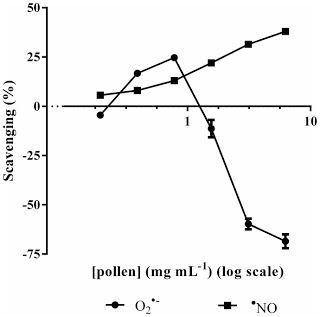Integrated Analysis of COX-2 and iNOS Derived Inflammatory Mediators in LPS-Stimulated RAW Macrophages Pre-Exposed to Echium plantagineum L. Bee Pollen Extract
Oxidative stress and inflammation play important roles in disease development. This study intended to evaluate the anti-inflammatory and antioxidant potential of Echium plantagineum L. bee pollen to support its claimed health beneficial effects.
The hydromethanol extract efficiently scavenged nitric oxide ((•)NO) although against superoxide (O2 (•-)) it behaved as antioxidant at lower concentrations and as pro-oxidant at higher concentrations. The anti-inflammatory potential was evaluated in LPS-stimulated macrophages. The levels of (•)NO and L-citrulline decreased for all extract concentrations tested, while the levels of prostaglandins, their metabolites and isoprostanes, evaluated by UPLC-MS, decreased with low extract concentrations.
So, E. plantagineum bee pollen extract can exert anti-inflammatory activity by reducing (•)NO and prostaglandins. The extract is able to scavenge the reactive species (•)NO and O2 (•-) and reduce markers of oxidative stress in cells at low concentrations.
NOTE: Echium plantagineum contains pyrrolizidine alkaloids and is poisonous.
